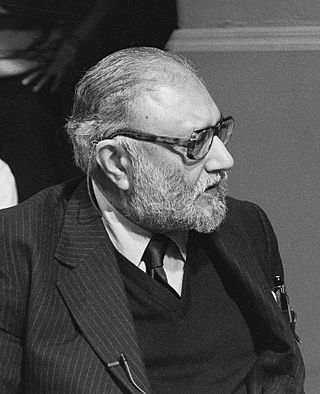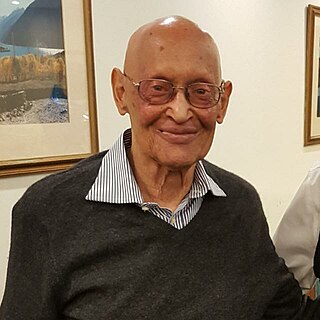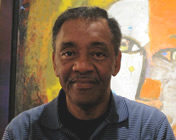Related Research Articles
The Dirac Medal is the name of four awards in the field of theoretical physics, computational chemistry, and mathematics, awarded by different organizations, named in honour of Professor Paul Dirac, one of the great theoretical physicists of the 20th century.

Mohammad Abdus Salam was a Pakistani theoretical physicist and a Nobel Prize laureate. He shared the 1979 Nobel Prize in Physics with Sheldon Glashow and Steven Weinberg for his contribution to the electroweak unification theory. He was the first Pakistani and the first Muslim from an Islamic country to receive a Nobel Prize in science and the second from an Islamic country to receive any Nobel Prize, after Anwar Sadat of Egypt.

The Government College University, is a public research university in Lahore, Punjab, Pakistan. GCU is ranked among the most prestigious academic institutions in Pakistan. Founded as Government College, Lahore, in 1864 under British administration, it became a university in 2002.
Jogesh C. Pati is an Indian American theoretical physicist at the SLAC National Accelerator Laboratory.

Edward Alexander Bouchet was an American physicist and educator and was the first African American to earn a Ph.D. from any American university, completing his dissertation in physics at Yale in 1876. On the basis of his academic record he was elected to the Phi Beta Kappa Society. In 1874, he became one of the first African Americans to graduate from Yale College.
Fernando Quevedo Rodríguez is a Guatemalan physicist. He was the director of the Abdus Salam International Centre for Theoretical Physics (ICTP) between October 2009 and November 2019.

The Abdus Salam International Centre for Theoretical Physics (ICTP) is an international research institute for physical and mathematical sciences that operates under a tripartite agreement between the Italian Government, United Nations Educational, Scientific and Cultural Organization (UNESCO), and International Atomic Energy Agency (IAEA). It is located near the Miramare Park, about 10 kilometres from the city of Trieste, Italy. The centre was founded in 1964 by Pakistani Nobel Laureate Abdus Salam.

Seifallah Randjbar-Daemi is an Iranian theoretical physicist. He is currently an Emeritus Scientist at the International Centre for Theoretical Physics.
The National Society of Black Physicists (NSBP), established in the United States in 1977, is a non-profit professional organization with the goal to promote the professional well-being of African Diaspora physicists and physics students within the international scientific community and the world community at large.

Riazuddin, also spelled as Riaz-Ud-Din, was a Pakistani theoretical physicist, specialising in high-energy physics and nuclear physics. Starting his scientific research in physics in 1958, Riazuddin was considered one of the early pioneers of Pakistan's nuclear weapons development and atomic deterrence development. He was the director of the Theoretical Physics Group (TPG) of the Pakistan Atomic Energy Commission (PAEC) from 1974 until 1984. Riazuddin was a pupil of the winner of the 1979 Nobel Prize in Physics, Abdus Salam.
Muhammad Masud Ahmad, best known as Masood Ahmad, was a Pakistani theoretical physicist and ICTP laureate known for his work in dual resonance and Veneziano model, a strings sting mathematically described the fundamental forces and forms of matter in quantum state.

Ghulam Murtaza, SI, FPAS, is a Pakistani theoretical physicist with a specialization in the physics of ionized plasmas, and is an Emeritus Professor of physics at the Government College University in Lahore. Murtaza's work is recognizable in plasma physics and controlled nuclear fusion processes to provide a better understanding of energy propagated by the main-sequence star, the Sun.

The Abdus Salam Centre for Physics, is a federally-funded research institute and national laboratory site managed by the Quaid-i-Azam University for the Ministry of Energy (MoE) of the Government of Pakistan.

Asghar QadirHI, SI, FPAS, is a Pakistani mathematician and a prominent cosmologist, specialised in mathematical physics and physical cosmology. Nowadays, he is widely considered one of the top mathematicians in Pakistan. Asghar has played a prominent role in promoting Relativity in Pakistan. To this day, Qadir has made important and significant contributions to the fields of differential equations, theoretical cosmology and mathematical physics. He is noted for his work in mathematics and mathematical physics, in particular his contributions to general relativity and cosmology.

Mohamed Hag Ali Hag el HassanOMRI GCONMC FAAS FIAS FTWAS is a Sudanese-Italian mathematician and physicist who co-founded numerous scientific councils. He is the President of The World Academy of Sciences and Sudanese National Academy of Sciences.
Fayyazuddin, also spelled as Fayyaz Uddin, is a Pakistani theoretical physicist, emeritus professor, specialising in theoretical physics and mathematical physics at Quaid-e-Azam University campus National Centre for Physics, Islamabad. He is a senior scientist at the National Center for Physics. Fayyaz is doing research in the fields of quantum mechanics, particle physics, and meson physics. He has published numerous physics papers accompanied by Riazuddin and has co-authored Quantum Mechanics by Fayyazuddin and Riazuddin published in 1990.
The Abdus Salam Chair in Physics, also known as Salam Chair in Physics, is an academic physics research institute of the Government College University at Lahore, Punjab province of Pakistan. Named after Pakistan's only Nobel Laureate, Abdus Salam, the institute is partnered with the Pakistan Atomic Energy Commission (PAEC) and International Center for Theoretical Physics (ICTP). While it is a physics research institute, the institute is dedicated to the field of Theoretical and Mathematical physics.

Milton Dean Slaughter is an American theoretical and phenomenological physicist and affiliate professor of physics at Florida International University. Slaughter was a visiting associate professor of physics in the Center for Theoretical Physics, University of Maryland, College Park while on sabbatical from Los Alamos National Laboratory (LANL) of the University of California from 1984 to 1985. He is also chair emeritus and university research professor of physics emeritus at the University of New Orleans (UNO). Prior to joining UNO as chair of the physics department: He was a postdoctoral fellow in the LANL Theoretical Division Elementary Particles and Field Theory Group (T-8); LANL Theoretical Division Detonation Theory and Applications Group (T-14) staff physicist; LANL Theoretical Division affirmative action representative and staff physicist; LANL assistant theoretical division leader for administration and staff physicist (T-DO); LANL Nuclear and Particle Physics Group staff physicist—Medium Energy Physics Division (MP-4); and LANL Historically Black Colleges and Universities (HBCU) project manager (laboratory-wide).

Ronald Elbert Mickens is an American physicist and mathematician who is the Fuller E. Callaway Professor of Physics at Clark Atlanta University. His research focuses on nonlinear dynamics and mathematical modeling, including modeling epidemiology. He also has an interest in the history of science and has written on the history of black scientists. He is a fellow of the American Physical Society and served as the historian of the National Society of Black Physicists. He has made significant contributions to the theory of nonlinear oscillations and numerical analysis.

Atish Dabholkar is an Indian theoretical physicist. He is currently the Director of the Abdus Salam International Centre for Theoretical Physics (ICTP) with the rank of Assistant Director-General, UNESCO. Prior to that, he was head of ICTP's High Energy, Cosmology and Astroparticle Physics section, and also Directeur de Recherche at the Centre National de la Recherche Scientifique (CNRS) at Sorbonne University in the "Laboratoire de Physique Théorique et Hautes Énergies" (LPTHE).
References
- 1 2 "EBASI - History". Edward Bouchet Abdus Salam Institute. Retrieved 4 January 2016.
- 1 2 "EBASI Constitution" (PDF). Edward Bouchet Abdus Salam Institute. Retrieved 4 January 2016.
- ↑ Kibble, T. W. B. (1998). "Muhammad Abdus Salam, K. B. E.. 29 January 1926-21 November 1996". Biographical Memoirs of Fellows of the Royal Society . 44: 387–401. doi: 10.1098/rsbm.1998.0025 . JSTOR 770251.
- 1 2 "Appointments" (PDF). Edward Bouchet Abdus Salam Institute. Retrieved 4 January 2016.
- ↑ "Abdus Salam Nobel Prize in Physics Biography". Nobelprize.org. 21 November 1996. Retrieved 9 December 2012.
- ↑ "The Edward Bouchet Abdus Salam Institute International Conferences". Edward Bouchet Abdus Salam Institute. Retrieved 4 January 2016.
- ↑ "Edward Bouchet Abdus Salam Institute". ICTP and Africa. Archived from the original on 4 March 2016. Retrieved 4 January 2016.